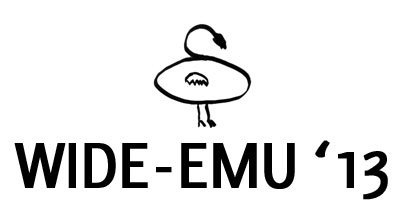
The Digital Rhetoric Collaborative has appointed five new Graduate Fellows who are eager to help foster conversations on the DRC site. Since the WIDE-EMU conference has been a site of development for the DRC in previous years, we look forward to new ideas emerging from the 2013 WIDE-EMU (un)conference to be held on Saturday, October 12, 2013 in Ypsilanti, Michigan.
This year, we proposed a “make” session, with the goal of hearing from the digital rhetoric community about ways we can make the DRC more useful in our classrooms and research spaces. Of course, we have some ideas, but we highly encourage you to talk with us at the conference and on our site. Let us know what you can contribute, too!
Here is a brief description of projects the DRC Fellows have been working on:
Enhancing the Conversations section of the DRC: We’re interested in pursuing the following ideas in our conversations section:
- Week-long Hack (technical skills, tool implementation and development) and Yack (theory-based analyses and investigations) post series by practitioners at-work on scholarly and pedagogical projects, coupled with suggested readings, websites, and videos.
- Webtexts of the Month with author(s) interviews and possibly live web-chats.
- Establishing a forum to promote collaboration among Hackers and Yackers, scholars and teachers, and digital rhetoricians of all sorts interested in developing digital studies, projects, and texts.
Continuing to develop the DRC Wiki: After getting some feedback about improving the DRC Wiki at WIDE-EMU 2012, we are looking for ways to facilitate contributions to the Wiki. Currently, we’re soliciting feedback to develop a history of Computers and Composition/Digital Rhetoric that accounts for the various branches of our field. We want to encourage contributions to the wiki so we adequately represent our diverse interests and backgrounds. One of our fellows is working with a class of Professional Writing majors in a digital rhetoric class at Michigan State to develop a history of digital rhetoric in professional writing. We welcome similar contributions to this project!
Expanding DRC Online Networks: In an effort to expand the reach and relevance of the DRC, we are looking forward to posting more teaching resources and relevant articles, as well as updates for conferences and other professional opportunities, on Facebook, Twitter, and now Pinterest. Like our page on Facebook, follow us on Twitter, and connect with us on Pinterest! Be sure to alert us to any great resources you find by tagging us or posting on our wall. We will also be hosting occasional blog carnivals and welcoming guests to post — we will welcome contributions and ideas for posts.
Bank of digital rhetoric lessons: We’re creating a bank of digital rhetoric lesson in which instructors can view not only a lesson plan but also feedback from several different instructors who have used that lesson (or one very similar) in their classes. The goal of this resource is to provide a sense of how lessons can be adapted to fit different courses, contexts and comfort levels (both of the instructor and the students). Someone pointed out in our first DRC fellows meeting that this goal sounded a bit like what happens on cooking sites, with each commenter adding their own tips and tricks for making a recipe sing. That’s exactly what we’ll be going for in this project – something provides not only the “recipe” for a good digital-focused lesson, but also some sense of what to expect when putting it into action, as well as some starting points in making it your own. Some classes have time to incorporate unit- or even semester-long digital projects, while others might only be able to fit in one assignment; some might be coding pros while others have never posted a blog entry. We encourage you to talk with us about lessons you’d like to see on the site. This project will serve as a resource to aid all instructors in seeing how lessons that seem at first unsuitable or intimidating might be tweaked to meet their needs – and how when even the best-laid digital lessons go astray, as they sometimes do, there can still be plenty of learning salvaged.
As you can see, we have many projects in the works. Our main objective is to get our community talking and learning from each other. Join us at our WIDE-EMU session, comment on this post, Tweet, Facebook, and/or email us at drcfellows@umich.edu to let us know how you can help!

3 Comments
How to join the DRC Wiki.
Link to DRC agenda for WIDE-EMU 2013.
Pingback: By Way of Introduction: Brenta Blevins — Digital Rhetoric Collaborative